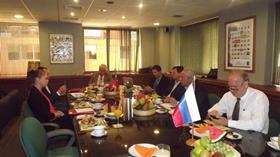
Representatives from Russia’s biggest supermarket visited Chile in a bid to build closer ties with suppliers of agricultural products.
Ivan Sergienko, who oversees imports and buying, and fresh produce import manager Elena Sherina held meetings with a delegation from Asoex, Fedefruta and the blueberry and kiwifruit committees.
“Magnit’s presence extends not just to the major cities but also to smaller cities, allowing us to reach new markets within Russia. With more than 9,000 outlets in 2,000 vicinities, it offers significant potential to introduce and position Chilean fruit,” Asoex president Ronald Bown said.
“Magnit is one of the few Russian chains that sources directly, without using middlemen, and has its own import and logistics arm, which adds to its attractiveness.”
Sergienko said the veto on imports from the EU, Turkey, the US and other markets meant there were good opportunities for Chilean fruit.
“We think there is potential to import more from Chile and that is why we are here today, because we are looking to replace the suppliers currently banned under the veto,” he said, adding that the quality of Chile’s fruit offer was well known.
In light of the devaluation the rouble has undergone in the past year, Sergienko said the idea was to increase import volumes so that prices became more competitive in order to incentivise consumers into buying Chilean produce.
“Our customers continue to show a high level of interest in winter grapes, apples and citrus – especially mandarins and lemons,” he noted.
After meeting with representatives from the fruit industry, the Magnit executives visited ProChile to learn more about the availability of Chilean produce and the promotions carried out by the organisation to support them in overseas markets.
Magnit is Russia’s leading supermarket group in terms of sales volume and number of outlets, as well as its fastest growing food retailer. It opened its first store in 1998 in Krasnodar and today has 9,020 outlets, mostly located in the south of the country and north of the Caucuses and in the Volga Federal Zone. Approximately two-thirds of stores are located in towns and cities with fewer than 500,000 inhabitants.
The chain has 25 distribution centres and a vehicle fleet of almost 5,700 and employs around 240,000 people.



